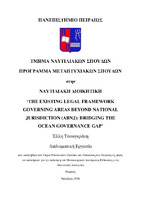| dc.contributor.advisor | Τσελεπίδης, Αναστάσιος | |
| dc.contributor.author | Τσουγκράνη, Έλλη | |
| dc.date.accessioned | 2021-05-20T08:21:00Z | |
| dc.date.available | 2021-05-20T08:21:00Z | |
| dc.date.issued | 2020-11 | |
| dc.identifier.uri | https://dione.lib.unipi.gr/xmlui/handle/unipi/13451 | |
| dc.identifier.uri | http://dx.doi.org/10.26267/unipi_dione/874 | |
| dc.description.abstract | Τα τελευταία χρόνια, το διεθνές νομικό καθεστώς προστασίας των ωκεανών του πλανήτη μας έχει επιτευχθεί μέσω της Σύμβαση των Ηνωμένων Εθνών για το Δίκαιο της Θάλασσας (UNCLOS), η οποία θεωρείται ως το «σύνταγμα» που εξασφαλίζει τη διακυβέρνηση των ωκεανών. Παρόλα αυτά, η συνεχής εκμετάλλευση των θαλάσσιων πόρων έχει οδηγήσει τους επιστήμονες και τη διεθνής κοινότητα να επιστήσουν την προσοχή τoυς στο θέμα της βιωσιμότητας της υπάρχουσας κατάστασης. Αξίζει να σημειωθεί πως το ισχύον καθεστώς συχνά αποδεικνύεται ανίκανο να προστατεύσει τις επίκαιρες προκλήσεις που αντιμετωπίζουν οι ωκεανοί, όπως η ανόμοια κατανομή της τεχνολογίας, η οποία θα μπορούσε να βοηθήσει τα κράτη στην καλύτερη ρύθμιση των θαλάσσιων δραστηριοτήτων βάση των κανονισμών. To θέμα περιπλέκεται περαιτέρω λόγω του ότι η δικαιοδοσία των παράκτιων κρατών σταματά σε συγκεκριμένα όρια απ’ όπου και ξεκινούν οι «ανοιχτές θάλασσες» (high seas) και οι «περιοχές πέραν της εθνικής δικαιοδοσίας» (Areas Beyond National Jurisdiction - ABNJ). Αυτές δεν εμπίπτουν εντός της δικαιοδοσίας συγκεκριμένων χωρών κι έτσι τα κράτη καλούνται να δουλέψουν μαζί ώστε να προστατεύσουν συλλογικά το θαλάσσιο περιβάλλον σε αυτές τις περιοχές. Αυτή η Δ.Ε. λαμβάνει υπόψη όλα τα παραπάνω και προσπαθεί να αναδείξει τους τρόπους με τους οποίους τα κράτη μπορούν να διασφαλίσουν την προστασία των περιοχών πέραν της εθνικής δικαιοδοσίας με βάση την προαναφερθέντα σύμβαση του ΟΗΕ κι έτσι να καταλήξει ότι αυτό μπορεί να πραγματοποιηθεί μέσω ουσιαστικής κρατικής συνεργασίας. Εξετάζονται επιπλέον συστάσεις οι οποίες αναδεικνύουν τα πρακτικά βήματα που μπορούν να ακολουθήσουν τα κράτη ώστε να διασφαλίσουν επιτυχώς το μέλλον των ωκεανών στις περιοχές πέραν της εθνικής δικαιοδοσίας. | el |
| dc.format.extent | 47 | el |
| dc.language.iso | en | el |
| dc.publisher | Πανεπιστήμιο Πειραιώς | el |
| dc.title | The existing legal framework governing Areas Beyond National Jurisdiction (ABNJ): bridging the ocean governance gap | el |
| dc.type | Master Thesis | el |
| dc.contributor.department | Σχολή Ναυτιλίας και Βιομηχανίας. Τμήμα Ναυτιλιακών Σπουδών | el |
| dc.description.abstractEN | In recent years, the global legal regime for the protection of our planet’s oceans has been governed by the UN Convention for the Law of the Sea (UNCLOS), which is also considered the ‘constitution’ for ocean governance. However, the continuous exploitation of marine resources has led scientists and the international community to raise alarms about the sustainability of the current situation. It must be noted that the existing regime can often be ineffective to deal with the modern challenges faced by oceans, such as the inequitable distribution of technological resources, that could greatly assist states to better regulate their marine activities in line with existing regulations. The issue is further complicated by the fact that state coastal jurisdiction ends at certain points and then begin the ‘high seas’, and the ‘areas beyond national jurisdiction’ (ABNJ). These do not fall under the jurisdiction of any specific countries and so, states are called to work together to collectively protect the marine environment in these areas. This thesis considers all the above and attempts to demonstrate the ways that states can ensure the protection of ABNJ on the basis of UNCLOS to conclude that this can be achieved through strong state cooperation. Recommendations are also considered to show that there are practical steps that states may follow to successfully create a sustainable future for ABNJ. The methodology used to produce the thesis included extensive research of academic papers, international legislation, policy publications and in general, a combination of primary and secondary resources. The majority of the resources were identified online through credible links, and many were provided to the writer by the supervisor which significantly assisted the analysis due to the rich materials provided. The bibliography provided is a testament to this. | el |
| dc.contributor.master | Shipping Management | el |
| dc.subject.keyword | ABNJ | el |
| dc.subject.keyword | Ocean governance | el |
| dc.subject.keyword | UNCLOS | el |
| dc.subject.keyword | Regional mechanisms | el |
| dc.date.defense | 2020-10-29 | |


